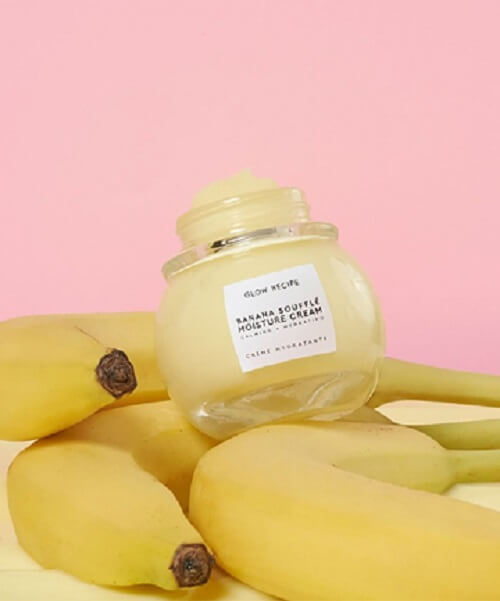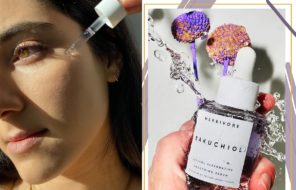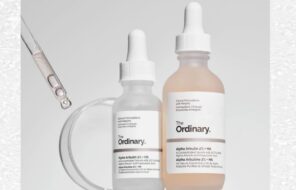Grapefruit cleansers, papaya face scrubs, watermelon brightening masks — fruits are a natural source of vitamins, minerals, antioxidants, and other do-good substances. So it only makes sense that they’re an “it” ingredient in skincare products.
The latest trend in fruit-based skincare? Banana extract. Like other fruit extracts, banana extract is a solution made by using water or alcohol to “extract” raw material from banana leaves and peels.
To unpack the benefits of banana extract, we turned to experts Dr. Cameron Rokhsar, founder and medical director of the New York Cosmetic, Skin, and Laser Surgery Center and associate clinical professor of dermatology at Mount Sinai Hospital, as well as Dr. Jenelle Kim, doctor of traditional Oriental medicine and founder and chief formulator of skincare formulation lab JBK Wellness Labs.
Does banana extract benefit the skin?
While research is slim, Rokhsar told us, “Banana extract is becoming popular in skincare because it contains several beneficial properties for the skin.” Some of these benefits include:
- Soothing and hydrating dry, sensitive skin. Banana extract contains natural oils, vitamins, and other compounds that moisturize and reduce inflammation. This may make banana extract particularly beneficial for dry, sensitive skin types.
- Improving skin elasticity and firmness. Banana extract contains amino acids that can help improve the elasticity and firmness of the skin to reduce the appearance of fine lines and wrinkles.
- Smoothing skin texture and brightening appearance. Banana extract is a natural source of alpha hydroxy acids (AHAs). AHAs are acids found in many foods, including sugarcane, milk, and fruits. They help exfoliate the skin by removing dead skin cells, leaving it smoother and brighter, according to Rokhsar.
- Protecting skin from free radical damage. Bananas contain antioxidants like dopamine, carotenoids, and flavonoids. In fact, research shows that bananas have a greater antioxidant potential than various berries, herbs, and veggies. These antioxidants may help protect the skin against damage from free radicals, but more research is needed to confirm this.
How is banana extract used?

Banana extract can be found in a variety of skincare products, including moisturizers, serums, masks, and cleansers. “It’s often added for its moisturizing and soothing properties and to help brighten the skin and improve overall texture,” Kim said.
According to Kim, banana extract can pair well with the following skincare ingredients:
- Hyaluronic acid. This acid is produced naturally in the body and helps hydrate and plump the skin.
- Vitamin C. This antioxidant brightens the complexion and improves skin tone.
- Niacinamide. Niacinamide is a type of vitamin B3 that builds keratin (a protein that maintains skin health), locks in skin moisture, and calms redness and irritation.
- Aloe vera. Aloe is a cactus-like plant that contains skin-healing properties. It can soothe and calm irritated skin when applied to the skin.
Is banana extract safe?
Banana extract is generally considered safe for the skin. Still, it’s smart to approach it with caution, especially if you have sensitive skin. “Although banana extract is generally considered gentle and non-irritating, some individuals with sensitive skin may experience redness, itching, or other adverse reactions,” Rokhsar said.
People with acne may also want to approach banana extract cautiously, as it may exacerbate their breakouts. As with any new skincare product, Kim suggested performing a skin patch test before using banana extract all over your face or body.
The American Academy of Dermatology Association (AAD) recommends applying the product to a test spot twice daily for seven to 10 days to perform a patch test. The underside of your arm or the bend of your elbow are good test site options. If you don’t have a skin reaction (like redness, itchiness, or swelling) after seven to 10 days, feel free to incorporate the product into your routine.
Finally, don’t use banana extract if you have a known banana allergy. “Banana allergies are relatively uncommon but can cause severe reactions in some people, including hives, swelling, and difficulty breathing,” Rokhsar warned.
When in doubt, consult a dermatologist to find out if banana extract is suitable for your skin type and goals.
Banana extract: a promising trend
Banana extract is the latest trendy skincare ingredient — and for good reason. This gentle ingredient contains a variety of vitamins, oils, and other compounds that hydrate, soothe, and improve the skin’s texture. It also boasts antioxidants, which can protect the skin from free radical damage.
You can find banana extract in moisturizers, serums, cleansers, face masks, and more. It’s often paired with other beneficial ingredients, including vitamin C, hyaluronic acid, niacinamide, and aloe vera. While banana extract is generally considered safe, people with sensitive or acne-prone skin should approach it carefully. Those with a known banana allergy should avoid it altogether.





